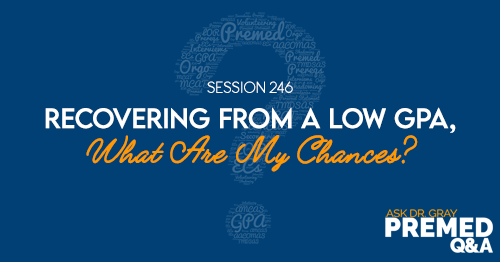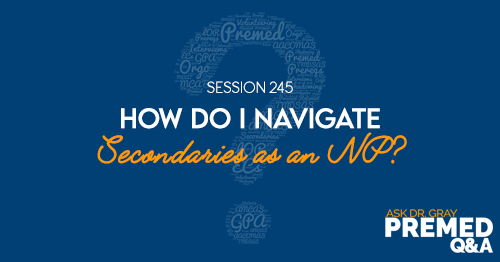Apple Podcasts | Google Podcasts
Session 210
This international student wants to know if they can follow the traditional application timeline or if they won’t be able to because of their international status. She is a third-year premed student at Allegheny College, Pennsylvania who is looking into applying to medical school. She wants to know how she can prepare for her medical school application coming up next cycle.
Ask Dr. Gray: Premed Q&A is brought to you by Blueprint MCAT. Listen to this podcast episode with the player above, or keep reading for the highlights and takeaway points.
The episodes in this podcast are recordings of our Facebook Live that we do at 3 pm Eastern on most weekdays. Check out our Facebook page and like the page to be notified. Also, listen to our other podcasts on MedEd Media. If you have any questions, call me at 617-410-6747.
Ask Dr. Gray: Premed Q&A is brought to you by Blueprint MCAT. Listen to this podcast episode with the player above, or keep reading for the highlights and takeaway points.
The episodes in this podcast are recordings of our Facebook Live that we do at 3 pm Eastern on most weekdays. Check out our Facebook page and like the page to be notified. Also, listen to our other podcasts on MedEd Media. If you have any questions, call me at 617-410-6747.
[02:25] Question of the Day
“I’m in the process of looking into my medical school right now…I am creating a list of medical schools that I wanted to apply to. What do you think are some specific requirements and criteria that I should look at when I look up for medical school?”
A: The biggest thing for you to start your search with is whether they accept international students. The biggest limiting factor is whether or not they accept international students.
If you Google or go to F1 Doctors which is a very popular site that helps international students apply to medical school, you can go and find the international-friendly medical schools. Check for the ones that don’t just say it, but actually have the data to support that they do accept international students. That is where you should begin your search.
After that, it’s all the normal stuff such as looking at location, the curriculum, and class size. Look at all these other things that are going to support whether or not you’re going to be a successful student at each of those schools.
[03:56] Getting Clinical Experience
Working as a Virtual Scribe
Q: I’m currently working as a virtual medical scribe. I’m working virtually and I just don’t know how to put it in. Is that considered clinical experience or shadowing experience? Or how can I put it in my application?
A: I would probably put it as clinical experience. It’s not shadowing, it’s clinical experience. It’s not a good clinical experience, especially now at this stage of the pandemic where in-person scribing is back up and running in most places. I don’t think virtual scribing is going to be looked at favorably. Ultimately, my recommendation is to stop doing virtual and get in-person scribing.
Working as a Health Coach
Q: The reason I work virtually is I’m working for a physician in New York, and my local hospital doesn’t offer any job for premed students. Shadowing as a premed is also pretty hard. Right now I am really trying to look into some in-person clinical experiences.
I’m also currently working as a health coach. I have my own patient. Do you think it is considered a clinical experience?
A: It’s not the best clinical experience. You could put it as clinical experience and try to write about it in a way that makes it look clinical. But I don’t think that’s any different than just being a personal trainer. I wouldn’t call it a personal trainer clinical experience.
[05:54] Getting Clinical Experience While Shadowing
Q: Right now, I have a lot of shadowing hours and I am really looking for clinical volunteer and clinical experiences.
Currently, I’m shadowing a neurologist. I have been shadowing her for over 100 hours. I shadow her 3 days a week. I walk into each patient visit with her and then shadow her to the ICU unit. She performs Botox injections for a migraine patient and also does spinal tap procedures for migraine.
It is mostly inpatient shadowing but it’s actually an outpatient clinic and both. She does on-call the first month of the first week of the month and then the rest of them, she does outpatient clinics.
A: She is at an outpatient clinic and she trusts you enough to have you around for 100 hours. Just ask her if you would love to get a little bit more hands-on and if you can I bring the patients back from the waiting room. Or if you can enter into their chart what they’re here for. Or if you can take their blood pressure and their vitals.
If you already have that relationship set, you are already there. They know you enough and trust you enough.
See if you can take that relationship one step further and start to do some clinical things with her instead of just shadowing.
[08:27] Research Required for Med School Application
Q: How much research do you think is enough for medical school application?
A: Research is one of the most overrated parts of the application for me. Premeds think that research is everything, but it’s not. If you like research, go do some research. Go explore it. If you don’t like it, you don’t like it. That’s okay. There are other ways to show that you’re inquisitive and like to ask questions.
With research comes other things that students think are important –- publications, poster presentations — those are great if you have them. They are not important in the grand scheme of things for the far majority of medical schools out there. They don’t care that you got a publication. It looks good, maybe. But they also understand that there are lots of games that are played with publications and stuff like. I would not worry about it. So if you have research and have not published anything, that’s okay.
[10:12] Writing the Personal Statement
Q: I just bought your book, the personal statement book because I’m starting to think about it. I will start reading your book, but what is your suggestion of starting? I do have stories, but I just don’t know how to put it in.
A: Step one, read the book. The goal of the personal statement is to tell the story about why you want to be a doctor. That’s my philosophy on the personal statement. It is about why you want to be a doctor. It’s not about – whether you are ready to be a doctor, or if you have the skills necessary to be a physician.
“The goal of the personal statement is to tell the story about why you want to be a doctor.” Click To TweetThe general framework that you will read about in the personal statement book, is to know what your seed is but don’t use that literal language. Too many students use that language nowadays.
It is when you were first exposed to healthcare that made you think about it as a career or something that you wanted to explore as a potential career.
It’s the story of that journey as to how you got here. It doesn’t need to be fancy. It doesn’t need to be unique. Most personal statements are very similar and that is okay. At the end of it, it needs to serve a purpose.
Reflect on the journey that brought you to where you are today and to why you want to be a doctor. Convey that story in your personal statement.
[12:20] Paying for Tuition in Medical School as an International Student
Q: I am aware that as an international applicant, I’m not eligible for any federal loans to pay for my tuition fee in medical school. What do you think I should do, thinking ahead and planning for my medical school tuition fee and living expenses? Are there any resources that you suggest I should look into or options?
A: There are lots of options. I’m not an expert on all of those options. F1 Doctor is probably the best place to go for those resources.
If they accept you and you are an international student who is not eligible for loans, you might need to put into a bank account a full four years’ worth of tuition to prove that you have the money.
Some schools will only want a year’s worth of money to prove that you have that money. You may be sitting here thinking that you don’t have anyone that has any of that money. That may be a hindrance for you to show that you can go to medical school here in the States, unfortunately.
'Each school is a little bit different with what they will require.'Click To TweetThe other option would be to get a private loan. You have someone cosign a private loan for you. Maybe you have family members here that have a little bit of equity in their homes and that they can cosign a loan for you. Or the medical school can offer a direct loan or offer a scholarship package to help you pay for it.
There may be many more so just do some more research on that. But it is a huge barrier for international students.
[14:30] Encouragement and Motivation for International Students
Q: I do really want to go to medical school, but at this point sometimes I think it’s just because of homesickness and I really need some encouragement and motivation to keep going.
I don’t have a lot of friends, international friends that are going down this path. And as an international applicant, I haven’t met any friends that are going in the same way as me so I don’t have any company whom I can share my struggle with.
A: Step one is to go to F1 Doctors and they will connect you with people. That is a huge part of it. If you don’t know anyone on this path who is similar to you, whether it’s the same ethnicity, being an international student on this journey can get lonely. And it’s hard to be alone on this journey and on any journey in life.
'It's hard to be alone on this journey. On any journey in life, it's hard to be alone.'Click To TweetThat is a big part of my whole message of collaboration, not competition. Whenever I travel, I try to have meetups and bring people together, to show them that they are not alone in this journey. So we just need to find you some friends and that’s relatively easy.
They are out there, you just need to go out and look for them as well. Go to F1 Doctors and connect with them. You will find them because I talk to a lot of international students all the time.
The big part of it, as you mentioned, is you miss home. You need to know what that looks like for you and what your ultimate goal is. Is your goal to stay in the States and practice medicine? Is your goal to go to medical school and then go back home? Those are questions that you can answer with enough soul-searching.
[17:01] Journey to the U.S. and the Dream to Serve and Become a Doctor
Q: This student began studying abroad in their freshman year of high school in Oregon. They have the goal of improving their English skills and experiencing a different culture and educational background.
At the time, they had not yet considered any further career aspirations. However, during their junior year of high school, after taking anatomy and biology classes, they became interested in pursuing a career in medicine.
Their ultimate goal is to practice medicine in the United States and serve non-English speaking individuals in their community who lack access to healthcare.
This desire was solidified when they accompanied a friend’s family to a doctor’s appointment where a language barrier prevented effective communication of symptoms and experiences. This moment inspired them to become a physician and help underserved areas in their community by providing medical care in their own language.
Now, those are the things that you need to be thinking about, as you question yourself if you should or should not do this. Think about those times and keep asking yourself if you still want that as a goal and a mission.
Links:
Medical School HQ Facebook page
Medical School HQ YouTube channel
Instagram @MedicalSchoolHQ
Join the Application Academy!
The Premed Playbook: Guide to the Medical School Personal Statement
The Premed Playbook: Guide to the Medical School Application Process
SEARCH SITE
LISTEN FOR FREE












